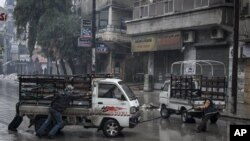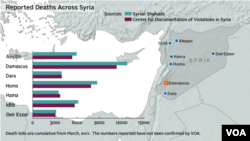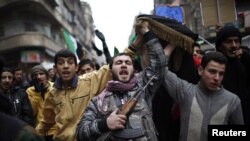TAL RIFAT, SYRIA —
They huddle around a barely effective aluminum stove that sits in the middle of the room and makes gurgling sounds as it burns its crude-oil fuel.
Like other families in Tal Rifat, a town in an enclave rebels carved out this summer in northern Syria stretching from Aleppo north to the Turkish border, 37-year-old Hassan, his wife and four young children are trying to get by the best they can.
But living conditions here are getting desperate as the rebellion against Syrian President Bashar al-Assad enters its 22nd grim month.
The crude oil they’re using to heat one room in the house is expensive. So is the gasoline for the car that Hassan needs for his work as a driver. Food is five times more expensive than last summer, when it was already high.
A week ago, the electricity the 40,000 townspeople rely on for most heat was cut and now they are struggling to keep the bitter winter cold at bay. Hassan and his family only use one room now to eat and sleep — the rest of the house is frigid.
“I am not sure we will make it through the winter here,” says Hassan, frowning as he looks at his four children. They tried a refugee camp before, spending three months in the Turkish town of Gaziantep, but conditions there too were rough and Hassan couldn’t work.
When the tent they were allocated collapsed in the rain, Hassan brought his family back to Tal Rifat to be close to his four brothers and three sisters.
Mostly, he worries about the children, ranging in age from four to 11 — their material needs, but also the stress they’re enduring.
“They all have nightmares,” he says through the shadowy light cast by a couple of battery-powered lights. Fatima, a pony-tailed five year-old, cries when she hears warplanes overhead that bomb the town about every two or three days, depending on the weather.
This evening the kids are excited, pleased to have the distraction of strangers. Earlier they had been frightened when a Syrian air force plane attacked a house about two kilometers away with a loud crash, illuminating the dark with an orange fireball.
Story continues below
Hassan’s eldest boy shows off a pile of spent cartridges. “I waved at the rebel soldiers and they gave me this,” he says, holding up his prize.
Schools bombed
A few weeks ago, the Syrian air force destroyed the local school, explaining that it was being used by fighters from the rebel Free Syrian Army, a claim dismissed by the townspeople. Now, some children attend classes at a makeshift school but most parents don’t send them, too afraid, too worried about airstrikes.
Tal Rifat is like other small towns in the rebel enclave — Iaziz, Al Bab, Marea — a rural community of farmers and traders where nothing much used to happen. Now they are in the eye of the storm, struggling to survive a winter that’s going to be harsh and could well push them to the breaking point as the fighting continues.
Already there’s grumbling about the FSA, despite the fact that Tal Rifat was one of the first northern Syrian towns to join the rebellion. Many townspeople don’t believe the rebels can end the conflict by force of arms. Instead, they believe the fighting will end only after the West intervenes or one of Assad’s aides assassinates him.
And anger is rising toward the West for what locals call a betrayal; they compare their plight to Libya’s, when the rebellion against Col. Moammar Gadhafi received NATO and American support. They conjure up ever more complicated conspiracy theories to explain the absence of western intervention, claiming a tie-up between the U.S., Israel and Hezbollah, the Lebanese Shia militia supporting its onetime patron, Assad.
“We have been betrayed by everyone,” says Hussein Khouri. “The West, Iran, Hezbollah. We use to admire Hezbollah when it was fighting Israel,” says the 56-year-old. “It is a conspiracy of hidden relationships. America wants to weaken Syria to help Israel and Iran has always wanted to control Syria, and Hezbollah is Iran’s creature.”
Depression over deaths
But most of all, local residents are struggling with deep depression over the deaths of relatives and friends, over the destruction of their businesses and homes and livelihoods.
Sam Harida is photographer without a camera. The blue-eyed 44-year-old shows clear signs of depression and says the fight has gone out of him. The photography shop he took over from his father was burned down last spring by Syrian army soldiers. “I feel destroyed inside,” he says. “They destroyed my work and my father’s. How do I start again? I don’t have the motivation.”
Ever the photographer, though, he pulls a cell phone from a pocket of his photographer’s vest and sighs as he shares pictures of the razed remnants of what his father had built.
Male nurses run a makeshift emergency medical facility in Tal Rifat. They worry about the mental health of people in the town and say women, children and the elderly are exhibiting stress-related symptoms of constantly fearing airstrikes. Without training to deal with psychological trauma, the nurses concentrate instead on immediate physical injuries and the war wounded.
They relocate the facility every few weeks for security reasons, as medical facilities in Aleppo have been hit by airstrikes or car bombs.
“We move it around because we fear it may get targeted," says one of the nurses, who asked not to be named. "We let people know by word of mouth where it is.”
This night, eight nurses hunker down in the facility's basement. It’s a quiet night, and over tea and cigarettes they explain how they improvise and do things they weren’t trained to do. Only two doctors have stayed in the area, but they take only private patients. “They will consult with us over the phone when we are really unsure about what to do,” says one nurse.
As with other makeshift emergency shelters in the rebel enclave, the facility in Tal Rifat relies on some cash from the FSA to keep going, and still it is short of equipment and drugs. Sometimes the nurses can borrow equipment from nearby Iaziz or even Turkey. They do have two incubators, but can’t use them because they don’t have a generator.
“If we had one, we wouldn’t be able to afford the fuel to run it,” says a nurse.
The lack of electricity across the rebel enclave is a huge obstacle for medical workers. In the Shaar district of Aleppo, a small surgical facility has been unable to carry out operations for the past two days. A doctor there explained that they normally try to do four operations a day, but now they don’t have the money to fuel their generator.
“Each operation costs us about $250 in fuel costs,” says Dr. Mohamed Abu Alaa. “The other day a journalist donated the money to allow us to run the generator for some surgery.”
With winter setting in, respiratory illnesses are soaring, and doctors across the rebel enclave worry that, deprived of electricity, families will lose young and old die to flu and pneumonia.
“We are going to see a lot of civilian deaths in January and February from the cold,” predicts Dr. Abdul Ahmed, a physician in Aleppo.
Like other families in Tal Rifat, a town in an enclave rebels carved out this summer in northern Syria stretching from Aleppo north to the Turkish border, 37-year-old Hassan, his wife and four young children are trying to get by the best they can.
But living conditions here are getting desperate as the rebellion against Syrian President Bashar al-Assad enters its 22nd grim month.
The crude oil they’re using to heat one room in the house is expensive. So is the gasoline for the car that Hassan needs for his work as a driver. Food is five times more expensive than last summer, when it was already high.
A week ago, the electricity the 40,000 townspeople rely on for most heat was cut and now they are struggling to keep the bitter winter cold at bay. Hassan and his family only use one room now to eat and sleep — the rest of the house is frigid.
“I am not sure we will make it through the winter here,” says Hassan, frowning as he looks at his four children. They tried a refugee camp before, spending three months in the Turkish town of Gaziantep, but conditions there too were rough and Hassan couldn’t work.
When the tent they were allocated collapsed in the rain, Hassan brought his family back to Tal Rifat to be close to his four brothers and three sisters.
Mostly, he worries about the children, ranging in age from four to 11 — their material needs, but also the stress they’re enduring.
“They all have nightmares,” he says through the shadowy light cast by a couple of battery-powered lights. Fatima, a pony-tailed five year-old, cries when she hears warplanes overhead that bomb the town about every two or three days, depending on the weather.
This evening the kids are excited, pleased to have the distraction of strangers. Earlier they had been frightened when a Syrian air force plane attacked a house about two kilometers away with a loud crash, illuminating the dark with an orange fireball.
Story continues below
Hassan’s eldest boy shows off a pile of spent cartridges. “I waved at the rebel soldiers and they gave me this,” he says, holding up his prize.
Schools bombed
A few weeks ago, the Syrian air force destroyed the local school, explaining that it was being used by fighters from the rebel Free Syrian Army, a claim dismissed by the townspeople. Now, some children attend classes at a makeshift school but most parents don’t send them, too afraid, too worried about airstrikes.
Tal Rifat is like other small towns in the rebel enclave — Iaziz, Al Bab, Marea — a rural community of farmers and traders where nothing much used to happen. Now they are in the eye of the storm, struggling to survive a winter that’s going to be harsh and could well push them to the breaking point as the fighting continues.
Already there’s grumbling about the FSA, despite the fact that Tal Rifat was one of the first northern Syrian towns to join the rebellion. Many townspeople don’t believe the rebels can end the conflict by force of arms. Instead, they believe the fighting will end only after the West intervenes or one of Assad’s aides assassinates him.
And anger is rising toward the West for what locals call a betrayal; they compare their plight to Libya’s, when the rebellion against Col. Moammar Gadhafi received NATO and American support. They conjure up ever more complicated conspiracy theories to explain the absence of western intervention, claiming a tie-up between the U.S., Israel and Hezbollah, the Lebanese Shia militia supporting its onetime patron, Assad.
“We have been betrayed by everyone,” says Hussein Khouri. “The West, Iran, Hezbollah. We use to admire Hezbollah when it was fighting Israel,” says the 56-year-old. “It is a conspiracy of hidden relationships. America wants to weaken Syria to help Israel and Iran has always wanted to control Syria, and Hezbollah is Iran’s creature.”
Depression over deaths
But most of all, local residents are struggling with deep depression over the deaths of relatives and friends, over the destruction of their businesses and homes and livelihoods.
Sam Harida is photographer without a camera. The blue-eyed 44-year-old shows clear signs of depression and says the fight has gone out of him. The photography shop he took over from his father was burned down last spring by Syrian army soldiers. “I feel destroyed inside,” he says. “They destroyed my work and my father’s. How do I start again? I don’t have the motivation.”
Ever the photographer, though, he pulls a cell phone from a pocket of his photographer’s vest and sighs as he shares pictures of the razed remnants of what his father had built.
Male nurses run a makeshift emergency medical facility in Tal Rifat. They worry about the mental health of people in the town and say women, children and the elderly are exhibiting stress-related symptoms of constantly fearing airstrikes. Without training to deal with psychological trauma, the nurses concentrate instead on immediate physical injuries and the war wounded.
They relocate the facility every few weeks for security reasons, as medical facilities in Aleppo have been hit by airstrikes or car bombs.
“We move it around because we fear it may get targeted," says one of the nurses, who asked not to be named. "We let people know by word of mouth where it is.”
This night, eight nurses hunker down in the facility's basement. It’s a quiet night, and over tea and cigarettes they explain how they improvise and do things they weren’t trained to do. Only two doctors have stayed in the area, but they take only private patients. “They will consult with us over the phone when we are really unsure about what to do,” says one nurse.
As with other makeshift emergency shelters in the rebel enclave, the facility in Tal Rifat relies on some cash from the FSA to keep going, and still it is short of equipment and drugs. Sometimes the nurses can borrow equipment from nearby Iaziz or even Turkey. They do have two incubators, but can’t use them because they don’t have a generator.
“If we had one, we wouldn’t be able to afford the fuel to run it,” says a nurse.
The lack of electricity across the rebel enclave is a huge obstacle for medical workers. In the Shaar district of Aleppo, a small surgical facility has been unable to carry out operations for the past two days. A doctor there explained that they normally try to do four operations a day, but now they don’t have the money to fuel their generator.
“Each operation costs us about $250 in fuel costs,” says Dr. Mohamed Abu Alaa. “The other day a journalist donated the money to allow us to run the generator for some surgery.”
With winter setting in, respiratory illnesses are soaring, and doctors across the rebel enclave worry that, deprived of electricity, families will lose young and old die to flu and pneumonia.
“We are going to see a lot of civilian deaths in January and February from the cold,” predicts Dr. Abdul Ahmed, a physician in Aleppo.






